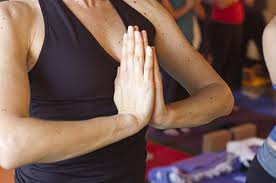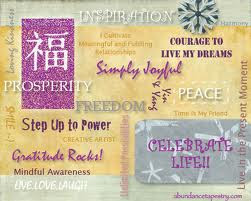Creating a sankalpa (or positive intention) at the outset of your practice brings deeper focus and power, especially if you can keep your intention active throughout the session. Effective intentions are short, affirming, and precise statements (or even a single word) of what you hope to receive from your practice time. Your intention can be self-directed (acceptance, patience, or humility, as three examples) or for the benefit of others (non-violence, gratitude, or awareness, as examples).
Of course, you can practice yoga without setting an intention; sankalpa is not necessary for moving into any of the poses. Nevertheless, as you begin to explore the mind/body connections that are part of yoga's power, setting an intention can benefit your practice in several ways.
First of all, setting an intention helps to focus your mind. You give yourself a goal (even if for only a minute or two) that isn't necessarily directed toward doing, but toward "being" (as in being accepting of self [acceptance], of being patient with yourself [patience], or recognizing that you aren't the most important being in the universe [humility]).
Your intention, or purpose, can set the tone of your entire practice. An empowering intention can make the difference between moving through class with calm and confidence or struggling through in the hope that the class will soon be over.
Setting an intention is something that we do frequently, it's not a high-powered transcendental principle. But that doesn't mean that positive intentions are not without power. We've all heard about the "power of positive thinking;" it's hardly a new concept. We set intentions every day, whether we are aware of them or not. If you left your home today, you had an intention. When you put the keys into your car's ignition, you had an intention and/or a destination. If you boiled water in the kettle, you had an intention. Interpersonal relationships are empowered and improved by affirming what is best in the other. Making an intention to "see the good" in others can transform a negative, or even toxic, interaction into a pleasant one.
Life being as it is, there are occasions when intentions and outcomes don't follow. We cannot control life's circumstances. In regard to an intention to drive to a destination, a flat tire can hinder our intended trip. The intent of putting a teakettle on the stove--a lovely cup of tea--might have turned into a cup of cold, bitter tea when an urgent phone call took precedence and attention. Presenting what is best of yourself and discovering what is best in others isn't always a guarantee of harmony. But that doesn't mean that the original intention wasn't valuable.
When we unroll our mats and settle into our practice, our private and personal intentions may or may not happen. Notwithstanding the outcome, our intentions give us opportunities to create something positive from the time we spend during our practice. Pushing through a physical challenge is a bit easy if we can focus on a motivating and inspiring reason. While we cannot control outcomes, we can control our way of being and how we react to outcomes.
The beauty and power of mind/body classes such as yoga is that we slowly work on our alignment. We align our bodies by the asanas, or poses. We balance our nervous system through pranayam, or breathing. And we can also recenter our emotional selves by sankalpa, or setting positive intentions. We don't have to perform the breathing exercises perfectly to benefit; our alignment doesn't have to be perfect when we do asanas to begin to feel our bodies get stronger and more flexible; so, to, we don't have to become perfectly serene beings to feel the positive effects of setting an intention for our practice.
Here are some intentions that I set for you when we practice together. That you
Stay present in the moment,
Practice without competition or self-criticism,
Relax and have fun,
Find a measure of sanctuary during practice, and
Do what works best for your practice.
At the end of our session, I revisit those intentions, often with gratitude, for our time together. Yoga is a powerful discipline for transforming our bodies and our selves.
Until next week, namaste
Nancy






